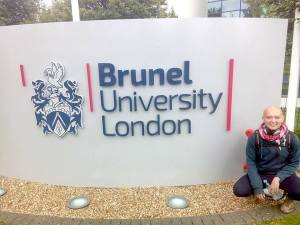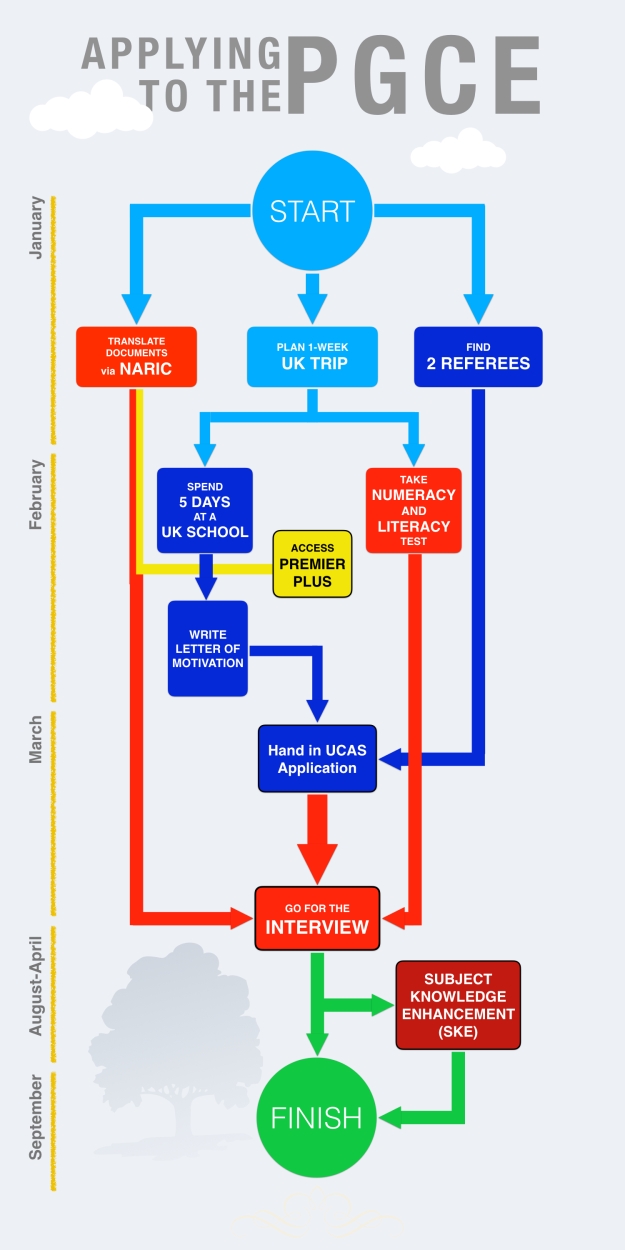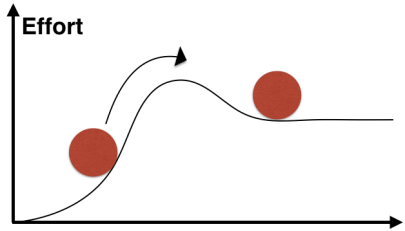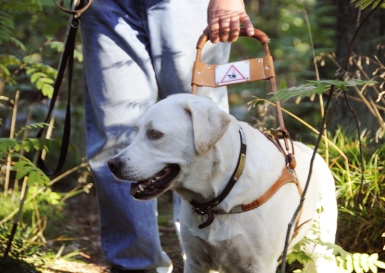 What if I told you that there is a way to become a qualified teacher within a year with little upfront costs? The only requirement you have to bring to the table is a Bachelors’ Degree as well as some basic Math and English proficiency. Your nationality and the subject you studied in your Bachelor don’t matter. Still interested? Then read on and learn about the Postgraduate Certificate of Education (PGCE) and how to apply for it!
What if I told you that there is a way to become a qualified teacher within a year with little upfront costs? The only requirement you have to bring to the table is a Bachelors’ Degree as well as some basic Math and English proficiency. Your nationality and the subject you studied in your Bachelor don’t matter. Still interested? Then read on and learn about the Postgraduate Certificate of Education (PGCE) and how to apply for it!
The reason I am writing this is twofold. First, not many people outside the UK know about the PGCE, which is a shame because everyone can apply for it. Second, applying for the PGCE can be tricky if you don’t know anybody who has gone through the process. It was an uphill battle for me, but I managed and now want to pass on that knowledge to you.
Teaching is a fascinating line of work. Many of the usual factors that people from other careers complain about – things like monotonous work, little personal development and no societal contributions – don’t exist when working with kids. You carry tremendous responsibility, every day is like no other and you never stop learning.
I was always interested in education, but never considered becoming a teacher. In Germany – where I’m from – teacher training takes seven years! First you have to attend lectures for five years and pass the state examination. If you pass you can start your two-year traineeship at a school. If you pass all of these hurdles you are finally a fully accredited teacher. After having spent 5 years studying already I wouldn’t have considered spending another 5 years without a salary, even though if studying in Germany is for free. Just when I thought that teaching would not be an option for me anymore I heard of the PGCE.
 I started my application in April 2015, sent it to universities in July and got my first successful application in September – a six month process. I am now training at Brunel University London to become a secondary science teacher. I have been teaching my first classes since last week at an outstanding school in the heart of London (20 observations I made at a London inner-city school). I’m always exhausted, but having a lot of fun. I am very confident that this is the right thing for me.
I started my application in April 2015, sent it to universities in July and got my first successful application in September – a six month process. I am now training at Brunel University London to become a secondary science teacher. I have been teaching my first classes since last week at an outstanding school in the heart of London (20 observations I made at a London inner-city school). I’m always exhausted, but having a lot of fun. I am very confident that this is the right thing for me.
Let’s make yours a reality. Also, SHARE this with friends who might want to work as teachers!
Content
- BEFORE WE START
- What will it cost me? Tuition fees and bursaries.
- What will I earn as a teacher?
- Teaching routes other than PGCE
- DO THIS NOW
- Translate documents
- Prepare a UK visit
- Get 2 Letters of Recommendation
- DO THIS IN A MONTH
- Apply through UCAS
- UNSUCCESSFUL APPLICATION
- INTERVIEW
- CONDITIONAL or UNCONDITIONAL OFFER AND SKE’s
- SOME FINAL WORDS – PGCE, NQT, QTS
BEFORE WE START
What will it cost me? Tuition fees and bursaries.
The PGCE tuition fees are in total £9,000 and you’ll be spending at least £400 for rent each month. In total, you’ll have about £15,000-20,000 costs in a year. If you can pay it, that’s wonderful! For the rest of you, here is what you can do:
If you are a foreign student you will have a hard time getting a loan – you are only eligible if you have lived in the UK for 3 or more years (Source). However, don’t forget to look at the bursary you are eligible for (Source). Your bursary depends on (a) your previous grades and (b) the subject you want to teach. These “1st”, “2:1” and “2:2” notations can be a bit confusing. Go ahead and check in which column you would fall by checking the “Overseas degree equivalency” (here).
Suppose you want to teach Biology with a 2:2 degree. That means you will be guaranteed a bursary of £15,000. Your tuition fees are £9,000, which leaves you with £6,000. If your living expenses are ~£800 per month you will have additional costs of about £8,000 (from September to May). You’ll be £2,000 short. That’s still a sweat deal I must say.
What will I earn as a teacher?
“On average, a teacher earns £37,400 a year” (Source). However, based on a blog by a fellow PGCE student (Source) you will probably start with about £1,300 per month in your pocket each month. Living expenses will probably be around £800. That leaves you with about £500 savings per month. You clearly don’t become a teacher for the money, but your wage will increase over the years. Your chances of landing a job are utopian. “9 out of 10 newly qualified teachers were employed within six months of completing training” (Source).
Teaching routes other than PGCE
I will be explaining how to apply for the PGCE, but you should be aware of these alternative routes:
- PGCE Primary Education: kids between the ages six and 14.
- School-centered initial teacher training (SCITT): While PGCE programs are offered by universities, SCITT programs are offered by schools. SCITT’s give you even more exposure to the school environment. Also, you can start earning a salary during your training. The downsides are that (a) you get less theoretical training, (b) you cannot continue with a Master of Education (MEd) and (c) you don’t get the PGCE, which can become important if you want to work internationally.
- Early years teacher: Teach kids between the ages zero and five.
- Further education: Teach 14 year olds to adults. You can teach vocational courses (e.g. apprenticeships), languages and many other training programs.
- Teach First: Teach First is an NGO that places you in schools in low-income areas. You get paid from day one, but you have to bring good grades and be quite resilient as your students will often times be very challenging. This is their YouTube channel.
DO THIS NOW
You can already officially apply for the academic year 2016/2017. It’s a rolling application, which means, the earlier you apply the better your chances. You can still get into a program in July (like I did), but your chances will diminish the longer you wait. I consider myself to be extremely lucky to have gotten a spot for this year. Hence, start now!
Orient yourself along the flowchart I made.
.
DO THIS NOW – Translate Documents
If you went to school and/or university abroad you will have to get your degrees checked by NARIC (here). Select the “Statement of Comparability” service (here), upload all your documents from secondary school to PhD (certificate + transcript). The service costs £55,20 and takes about 10-15 working days. If your documents are NOT in English, then you’ll have to go for a “Statement of Comparability with Translation Waiver Service” (here), which can be done for these languages: Arabic, Bulgarian, Catalan, Chinese, Danish, Farsi, French, German, Italian, Macedonian, Norwegian, Polish, Portuguese, Romanian, Russian, Serbian, Spanish, Swedish. If your language is not among these then you have to get them translated and certified by a notary in your country before sending them in English to NARIC. The translation takes 10-15 working days.
As soon as you have your documents translated, you can (AND SHOULD) apply for the “Premier Plus” service on the “Get into Teaching” website. You will get an actual teacher to guide you through the application process. This is a free service and you must absolutely take advantage of this. However, the service is only available for students with a 2:2 degree or better.
DO THIS NOW – Prepare your UK visit
There are three things you need to take care of in the UK:
- The Literacy Skills Test: If you didn’t do the General Certificate of Secondary Education (GCSE) during your education, then you have to take the tests. It doesn’t matter how good your English is. The test is free of charge and can be taken up to three times. It checks for your spelling, punctuation, grammar and comprehension. You can access past test to practice before taking the test (Past Tests) and you can sign up at a local test center (Skills Test). I really can’t say how difficult it will be for you. It may be a walk in the park or for you or require a few days of preparation.
- The Numeracy Professional Skills Test: Same story. Take it if you didn’t do the GCSE. You can take the test at the same test center and even on the same day if you like. Past exams are here and you can sign up here. I highly recommend the past tests. Take a day or two to prepare for this. It’s not difficult, just many things that you probably have forgotten by now.
- At least 5 School Experience Days: You need to have been observing lessons at a UK school for at least 5 days (some universities only require 3, some more than 5). Your experience will form a central part of your Letter of Motivation. Universities will not consider you if you don’t have the required experience days. You can (1) write schools directly and ask if they would have you and (2) access a booking system by the Department for Education (Source). You can only get access if your foreign degrees have been translated by NARIC to be 2:2 or better.
DO THIS NOW – Get Two Letters of Recommendation
Your first letter of recommendation should come from a university or college, preferably somebody who knows you well. Your second letter of recommendation should be someone who can comment on your character and suitability for teaching. Read the details here.
DO THIS IN A MONTH
Apply Through UCAS
First, find the universities you want to apply to. I would first choose a city where you want to do your PGCE. This can be England, Wales and Northern Ireland. Scotland uses a different system and they don’t offer the PGCE (they have a very similar program called the PGDE. It’s definitely worth checking out if you want to study in e.g. Edinburgh, Glasgow or St. Andrews). It makes a lot of sense to apply to London based universities because (a) there are so many of them and (b) you won’t have to travel across the country for the interviews.
If you want to find out about the quality of the program, the best thing you can do is check out the latest Ofsted inspection (Source). Ofsted is a very respected governmental body that assures quality at universities and in schools. You want to find university programs that have been rated ‘outstanding’.
You can start your application via the UCAS Teacher Training site (Source). You can apply to three universities. The application fee is £23.
These are the components you need to submit with your application.
- Letter of Motivation: You can get some help on how to write it (Source). In short, you need to talk about (1) why you want to become a teacher, (2) your observations during the school experience days, (3) why you think you’ll be a great teacher, (4) what you’d like to do after the PGCE.
- 2 Letters of Recommendation: Here are the basic guidelines (Source).
UNSUCCESSFUL APPLICATION
If all your applications failed you enter the Apply 2 track. You can basically continue applying to one university at a time until September/October when the courses start. You don’t have to pay an extra fee.
THE INTERVIEW
If the university is interested in you they will invite you for an interview. That means, you have to book a second flight and come over to the UK. Alternatively, you may ask them to schedule an interview over Skype. You should also have a reason why you applied to that specific university! Your host university will tell you what to bring, but in short you can expect to bring along the following:
- ID with photo
- Evidence of GCSE equivalent degree (NARIC translated)
- Certificates (e.g. Bachelors’ Degree) à May need to be original
- Transcripts showing the grades of all individual subjects à May need to be original
- Evidence that you passed the Literacy and Numeracy Professional Skills Test
You may be asked to:
- Give a presentation (prepared in advance)
- Simulated classroom with a bad behaving student
- Personal interview with the recruiter
- Write further tests: The universities sometimes have in-house test in order to ensure that you fulfill their standards.
CONDITIONAL or UNCONDITIONAL OFFER
If you are given an unconditional offer you are all set. Start looking for a place to live because you are starting your teacher training in September!
If you are given a conditional offer you will probably have to take a Subject Knowledge Enhancement (SKE) course in the subject you want to teach. The courses can sometimes take until July/August – depending on the course you want to teach. But don’t worry! These courses don’t cost anything and you can even get a bursary of up to £7,200 for that (Source)! They may start as early as in April and their duration varies depending on the subject you need to freshen up. Find out more about SKE courses (Source).
SOME FINAL WORDS – PGCE, NQT and QTS
Once you’ve successfully applied to a PGCE program you can look forward to one heck of a year. It is going to be very demanding. You’ll be training in the classroom from October to December and then again from February to May. The successful completion of the PGCE will allow you to work in any school in the United Kingdom (excluding Scotland) as a so called “Newly Qualified Teacher” or NQT. In your first year you will still be observed in your classroom from time to time. If the observers (other teachers) are confident that you do your job well you will be awarded the “Qualified Teacher Status” or QTS. Congratulations, you can now work as a teacher without supervision!
Finally, you can also work as a teacher abroad since the PGCE is recognised by many countries and schools around the world. However, your QTS can only be done at a British school. Keep that in mind!
Do let me know if you have any further questions. I’d be more than happy to help you out!
And don’t forget to subscribe to my blog. It would be great to see you around!




